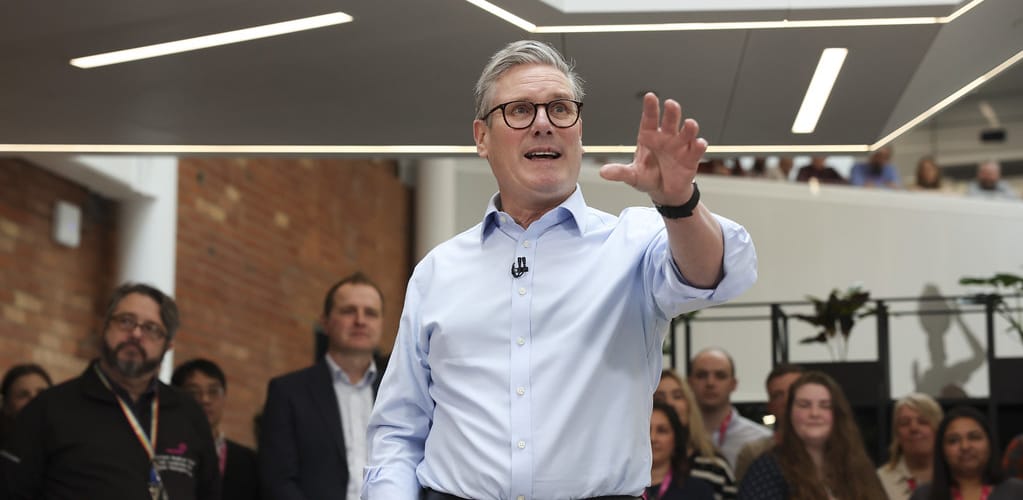
Keir Starmer doesn’t understand the benefits system
The UK government’s latest disability benefit cuts, framed as economic reform, ignore systemic issues like worsening health and inaccessible jobs. Instead of supporting Disabled people, ministers prioritise cost-cutting over social inclusion.
by MIKEY ERHARDT —
Campaigner at Disability Rights UK (DR UK),
a leading pan-disability Disabled people’s organisation.
S peak to almost any British government minister from the past 15 years, Conservative or Labour, and you might be left with the impression that the sole purpose of the social security system is to get people into work.
Take Labour’s employment minister, Alison McGovern, who earlier this month told the Financial Times that the benefits system is a “serious problem” and must be redrawn so “we increase the possibility, the chance, the likelihood of people moving into work”.
That redrawing is now taking place. After months of rumours, media speculation and spin, we now know that the government plans to make the billions of pounds of savings it has promised by freezing the rate of the main disability benefit, the personal independence payment (PIP), as well as making support harder to access and cutting it for those judged unfit for work.
A green paper outlining all of these changes in full is expected to be published within the next week. If it wasn’t already obvious, Starmer made clear that the reform’s aim is not better protecting Disabled people but rather “kickstart[ing] growth”. Defending his plans at Prime Minister’s Questions, he said that the current system “is indefensible, economically and morally” and that getting people into work is a “moral imperative”.
This is in line with what the PM reportedly told Labour MPs at a private meeting about the upcoming cuts on Monday night. The prime minister is said to have described the current welfare system as “the worst of all worlds”, claiming it discourages people from working while producing a “spiralling bill”.
Although you wouldn’t know it from the prime minister or his ministers’ comments in recent months, the apparently “unsustainable” growth in the number of benefit claimants is not a coincidence.
It’s due to “worsening population health and its interaction with structural factors”, explains the Joseph Rowntree Foundation, a charity that works to eradicate poverty in the UK. These factors include “the condition of health-related public services (like the NHS or social care) and the labour market (such as how adapted jobs are for people with health conditions)”.
Cutting PIP won't make any difference to these longstanding issues. On the contrary, the effects of the government’s proposals are obvious: they will make more people sicker, further undermine everyone’s right to a decent quality of life and further entrench the barriers to access, employment, and social inclusion that many Disabled people face.
As the media quickly works to position Labour’s proposals as historic or radical, it is important to put them into the wider context of disability history. Any scholar of Disabled people, our history, and our movements will tell you that proposals to limit what support Disabled people get from the state are nothing new.
In Autism Is Not A Disease: The Politics of Neurodiversity, author Jodie Harer points out that more than £5 billion has been cut from the benefits budget after a decade of austerity.
Some 60% of Disability benefit claimants are already worried that they don't have enough to live on. Welfare reforms since 2010 mean Disabled people have lost benefit payments of around £1,200 each year, while non-disabled people have lost around £300.
And yet, despite these attempts to reduce the ‘bill’, it continues to grow. The number of working-age people reporting that they have a disability increased from 5.9 million in 2012-13 to 8.9 million in 2022-23, according to research by the Resolution Foundation think tank in 2023. And no, contrary to ministers and some pundits’ claims, the same research found there is scant evidence that it is ‘easier’ to get disability benefits today, with award rates for new PIP claims broadly steady at around 45% since 2015-16.
So why is yet another prime minister, arguably the ninth since John Major, trying to put a round peg into a square hole by pursuing further benefit cuts in pursuit of an almost mythic ‘growth’?
Disabled people have essentially been “excluded from the welfare state” ever since the implementation of the Beveridge report after the Second World War, author and trailblazer Ellen Clifford has often pointed out, including in her book, The War on Disabled People.
A key factor in this has been the prevalence of the medical model of Disability, which views disability as an individual, medical problem that should be prevented, cured or contained.
As times have changed, successive British governments have become much less comfortable being explicitly discriminatory towards Disabled people. But the medical model is still viewed as common sense in the heart of Whitehall – as can be seen by Starmer’s plans – which allows politicians to feel comfortable seeing people’s value as dependent solely on their capacity to work.
So, despite the years passing, civil servants still view public services such as the benefits system as handouts given to Disabled people because we have impairments, not because of the unfair way the society has been designed. Those in the highest offices of government still see our existence as Disabled people as the problem they need to address, rather than the barriers we face. Why else would Rachel Reeves say the government needs “to get a grip with the rising welfare bill”?
Disabled people are not a scapegoat for a failing economy; we are a community that deserves improved opportunities and employment for those who wish to work.
And so, the upcoming green paper will mark the beginning of yet another cycle of cuts to services harming an increased number of people, which leads to higher demand for what meagre support is left, which in turn leads to calls for those resources to be cut due to rising costs.
It's just bad economic thinking. We know that disability benefits are vital to the day-to-day running of the UK economy, and cutting them even more will worsen the economic picture for everyone.
Getting support through benefits is equivalent to an average annual well-being improvement valued at £12,300 per person, according to research by Z2K, an anti-poverty charity. This means that if everybody in the welfare system were properly supported, it could lead to £42 billion in annual economic benefits.
But this sort of economic thinking is too much for the government orthodoxy, which hopes that treading the same path as every government I’ve lived under will somehow lead to new results.
Ultimately, the benefits system isn’t just some pipeline into the world of work – it’s a vital piece of social infrastructure that protects us from the sharpest edge of our unequal society.
Years of bad decisions mean that instead of providing the resources we need and funding the services we depend on, governing politicians have created a system that is almost impossible to navigate and slow to respond. This impacts people both in and out of work, forcing many of us into jobs with low wages and bad working conditions, restricting us from being able to create the life we want for ourselves and our families.
Not for the first time, the government’s focus on this issue has been completely wrong. It continues to fixate on the symptoms of our sick and broken society rather than tackling the root cause. It thinks it can just cut us off from vital support, and economic growth will follow. It’s wrong.

GOING FURTHER
Sir Keir Starmer says welfare bill is 'indefensible' - so what cuts could be announced? | SKY NEWS
Why is Keir Starmer’s government seeking to cut the benefits bill? | THE GUARDIAN
Starmer insists ‘there’s no return to austerity’ despite benefits and civil service cuts | THE INDEPENDENT
Sources:
▪ This piece was first published in openDemocracy and re-published in Europeans TODAY on 14 March 2025 under a Creative Commons Attribution-NonCommercial 4.0 International licence. | The author writes in a personal capacity.
▪ Cover: Flickr/Number 10. (Licensed under a Creative Commons Attribution-ShareAlike 4.0 International License.)






[Read our Comments Guidelines]